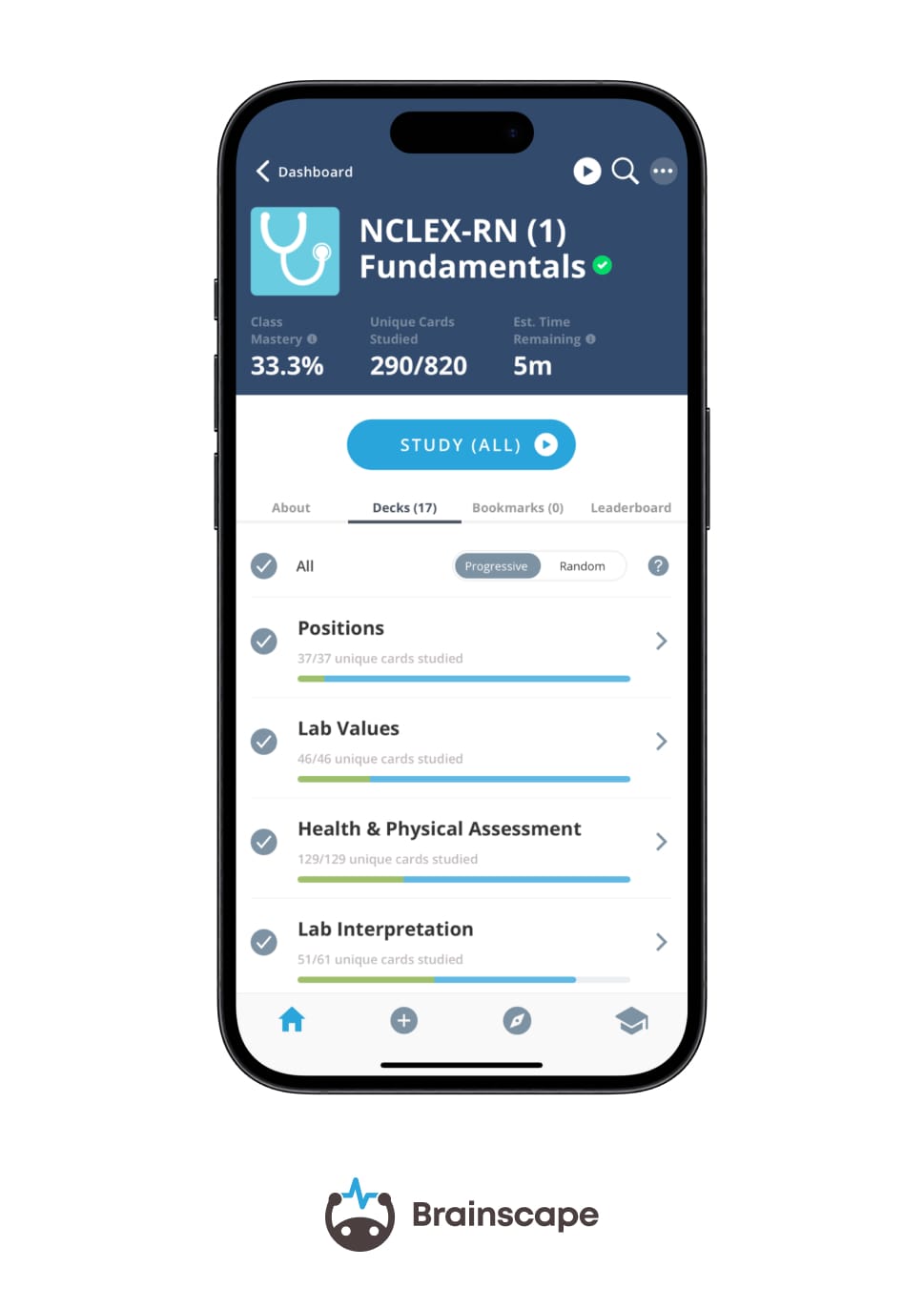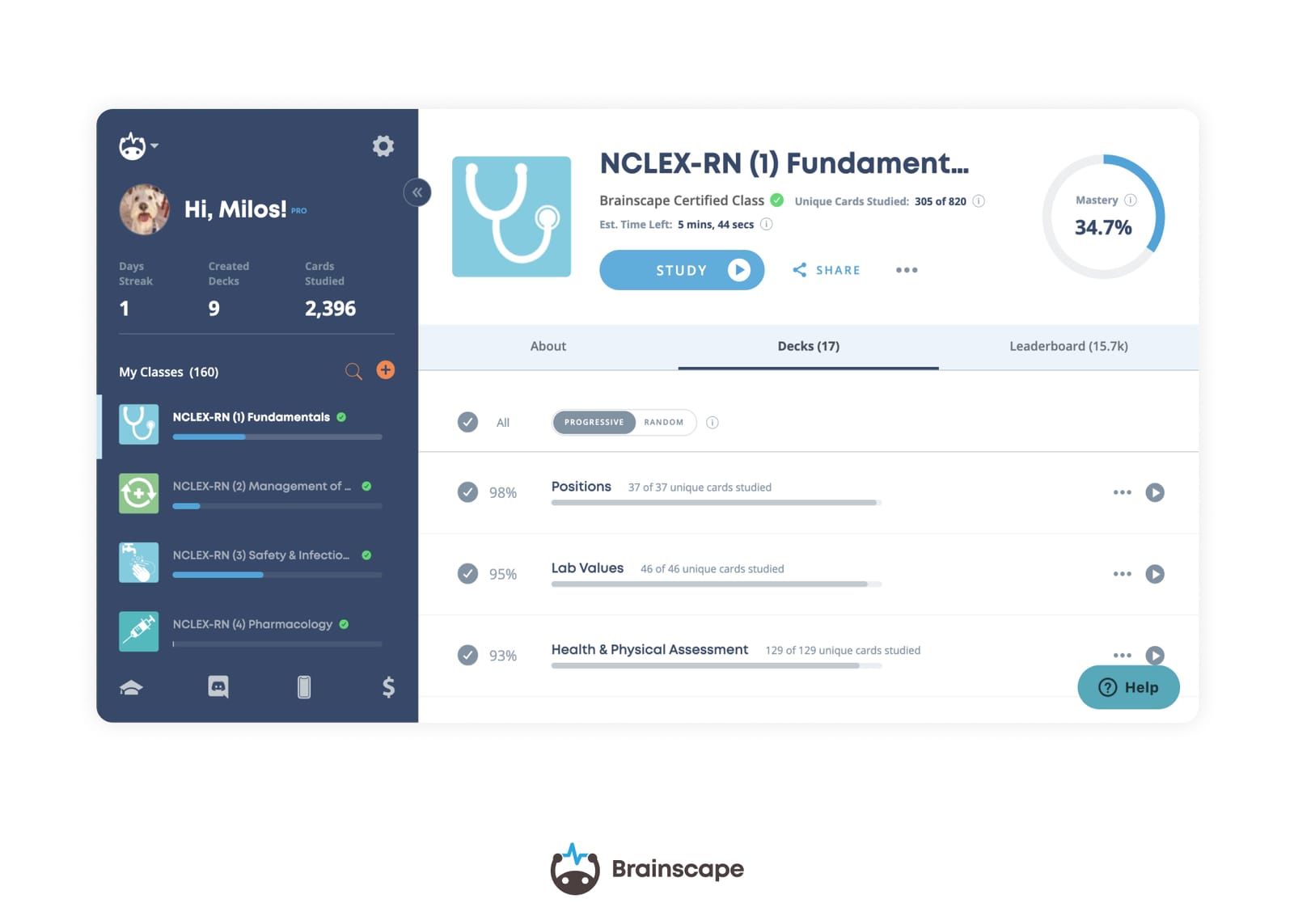Learning your NCLEX medications is vital for passing the exam and for practicing safe nursing. It's also the hardest, driest, and most overwhelming part of preparing for your licensing exam! And it’s easy to see why.
There’s a seemingly endless list of NCLEX meds, side effects, technical terms, and nursing considerations for Every. Single. One. of our modern medications. The good news is that you don't have to remember it all: there are certain facts you have to know and others you can bypass, and in this guide, we'll let you know which is which.
What To Learn For Each NCLEX Medication
If you tried to learn every single thing about all the NCLEX meds covered in nursing school, you’d still be studying five years later. Fortunately, you don’t need to do this. Here’s what you need to know about each medication:
- Medication classifications
- Medication prefixes and suffixes
- Generic names
- The indication
- How the medication works (and which bodily system it influences)
- Side effects (the most common and the serious adverse reactions)
- Nursing considerations
If this still seems like a long list, that’s okay. The truth is that all of these factors relate to each other, so learning one will help you to learn the others, and we'll be guiding you through that in the coming sections.
#1. How To Study For The NCLEX: Learning Your Medication Classifications
Here’s a list of the NCLEX medication classifications you’ll need to learn:
- Amphetamines
- Anti-allergy drugs
- Anti Alzheimer’s
- Antibiotics
- Anticonvulsants
- Antidepressants
- Antidiarrheals
- Antiemetics
- Antigout
- Antilipidemics
- Antineoplastics
- Antiosteoporotic
- Antiparkinsonians
- Antipsychotics
- Antispasmodics
- Anxiolytics
- Bronchodilators
- Corticosteroids
- Diuretics
- Erectile dysfunction drugs
- H2 receptor blockers
- Insulins
- Laxatives
- Muscle relaxers
- NSAIDs
- Opioids
- Proton pump inhibitors
- Stool softeners
- Thrombolytics
Again, this may seem like a long list! (Welcome to the NCLEX). But if you spread these over several weeks or months, it’s very manageable. The most digestible way to understand and memorize all of this information is with digital flashcard apps like Quizlet or Brainscape.

#2. How To Study NCLEX Meds: Learning Medication Prefixes & Suffixes
As a nurse, it’s important to know your LOLs (beta-blockers) from your NITRO (antianginal). Learning the prefixes and suffixes for each classification of medication helps in two ways:
Firstly, it reduces what you need to learn because all you have to memorize is the prefix or the suffix of the NCLEX medication, and not the whole name.
For example, beta-blockers all end in the suffix -lol. So now you know that when you come across medications like Atenolol, Carvedilol, Metoprolol, or Nebivolol, it's a beta-blocker. In other words, instead of learning those FOUR medication names (and more), all you need to remember is that “-lol means “beta-blockers.”
Secondly, learning the prefixes and suffixes of your list of NCLEX meds gives you another hook to hang your knowledge on.
For example, if a patient comes to you with unpleasant side effects from Nebivolol, you will know immediately from the suffix that they're taking a beta-blocker. So, even if you’ve forgotten the exact particulars of the drug, your general knowledge of beta blockers will help you understand why the patient may be having side effects.
#3. How To Study For The NCLEX: Learning The Generic Names Of Medications
For every drug, there’s a generic name, which refers to its chemical makeup. And then there’s the specific brand name developed and trademarked by a pharmaceutical company.
For example, the generic name for a strong opioid analgesic is Fentanyl. Some of the brand names for this drug are: Sublimaze, Actiq, Duragesic, Fentora, Abstral, Lazanda, and (many) others.
You’ll ONLY need to learn the generic names of the NCLEX medications and not all the brand names.
#4. How To Study NCLEX Meds: Learning The Indication(S)
The indication is what the drug is used for. For example, ACE inhibitors are used to decrease blood pressure and heart rate to prevent myocardial infarction.
Understanding what the different NCLEX medications are used for (and how to safely use them) is a baseline requirement of your nursing education. Nurses must safely administer medications, answer patient questions, and identify side effects and adverse reactions. This requires nurses to have a thorough working knowledge of the most common medications prescribed.
#5. How To Study For The NCLEX: Learning How Medications Work (The "Mechanism Of Action")
The mechanism of action is how the medication works in the body at the cellular level. Knowing this will help you connect the drug to its indication and side effects.
For example, you know that ACE inhibitors treat hypertension: that’s the indication. The way they do this (the mechanism of action) is by preventing the conversion of angiotensin I to angiotensin II. Angiotensin II is a potent vasoconstrictor. In other words, ACE inhibitors help to enlarge blood vessels, which, therefore, decreases blood pressure.
Understanding how the facts fit together is a powerful way to incorporate new knowledge into your memory inventory. When you connect cause and effect in a strong framework, you’re adding extra ‘hooks’ your brain can use to retrieve information during any exam or even on the job.
Therefore, knowing the mechanism of action for each NCLEX medication is important, both to give you a good knowledge base for prescribing meds and to help you memorize all the most important uses and side effects.
#6. How To Study NCLEX Medications: Remembering The Side Effects & Adverse Reactions For Each Med
Have you ever read the back of a pill bottle? Drug companies these days list every possible side effect that can arise (and several that have been noted in only a few patients). Fortunately, you don’t need to memorize this whole list of the required NCLEX medications.
The important side effects you should learn and remember include the following two categories: common side effects and killer side effects.
Killer side effects refer to rare cases when medications can have severe adverse reactions, such as anaphylaxis. You can expect these to come up in the NCLEX because a top priority of this test is to assess whether student nurses can provide safe and effective care for patients. If one misses a killer side effect, the patient could die, so make it a priority to memorize these NCLEX medication facts!
#7. How To Study For The NCLEX: Learning The Nursing Considerations
Nursing considerations are the interventions you need to do before administering a medication to a patient, such as referring to labs, running assessments, teaching the patient about med administration, and warning them of any contraindications.
For example, orthostatic hypotension can be a side effect of calcium channel blockers. Therefore, a nursing consideration when administering them would be to check the patient’s blood pressure to make sure it’s not too low (< 100/60).
Another example: beta-blockers can cause bronchoconstriction, so administering them to a client with asthma could lead to difficulty breathing.
Answering NCLEX practice questions is a great way to test your ability to combine your knowledge of side effects and nursing considerations to make good decisions.
The Best Tool For Learning And Remembering NCLEX Meds

Now that we’ve covered what to learn when you’re studying NCLEX medications, it’s time to look at how you can best and most efficiently learn these facts. The answer is digital flashcards. They supercharge your learning using three principles:
- Active recall: Flashcards train you to retrieve information from memory rather than recognize it on a page. This retrieval effort strengthens the neural pathways that store that knowledge, making it easier to remember when you’re under pressure.
- Spaced repetition: The key to long-term learning is revisiting material at just the right intervals. Digital flashcard apps such as RemNote or Brainscape automate this process by resurfacing tougher cards more often and easier ones less frequently. The result? You study exactly what you need, when you need it, without wasting any time.
- Metacognition: Many apps let you rate how confident you feel after each flashcard. That reflection helps you pinpoint your weak spots so you can focus your study energy where it counts most.
As an added bonus, these apps take the entire NCLEX curriculum and fit it into your pocket via your phone, so you can study anytime, anywhere! 5 minutes between clinical rotations, or 10 minutes on the train? Open them and start studying without eating into your free time.
Summary: How To Study NCLEX Meds
In summary, NCLEX medications are a body of knowledge that many students find overwhelming. However, learning what you need to is not quite as difficult as it first appears. For common medications, you’ll need to know:
- Classification
- Prefixes and suffixes
- Generic names
- Indications (what the medication is for)
- How the medication works
- Side effects and adverse reactions
- Nursing considerations
Using digital flashcard apps, you can do this with just a little study each day. Algorithms like RemNote or Brainscape will keep your learning at the optimal pace so you can efficiently commit this body of knowledge to memory, empowering you to take the NCLEX with confidence and embark upon a rewarding career in nursing.
**NCLEX-RN® is a registered trademark of the National Council of State Boards of Nursing (NCSBN), which neither sponsors nor endorses this product.
Additional Reading
- How to study medications for the NCLEX
- The best way to use NCLEX practice questions
- Does it matter which nursing school you attend?
References
Butterfield, B., & Metcalfe, J (2006). The correction of errors committed with high confidence. Metacognition and Learning, 1(1), 69-84.
Kang, S. H. (2016). Spaced repetition promotes efficient and effective learning. Policy Insights from the Behavioral and Brain Sciences, 3(1), 12–19. https://doi.org/10.1177/2372732215624708
Top NCLEX practice questions you should study. Nurse.org. (n.d.-c). https://nurse.org/education/nclex-practice-questions/
Xu, J., Wu, A., Filip, C., Patel, Z., Bernstein, S. R., Tanveer, R., Syed, H., & Kotroczo, T. (2024). Active recall strategies associated with academic achievement in Young Adults: A systematic review. Journal of Affective Disorders, 354, 191–198. https://doi.org/10.1016/j.jad.2024.03.010
